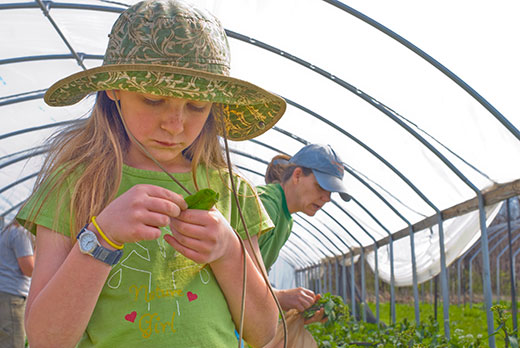BY CLARE HOWARD
It’s a “myth” that pesticides are needed to feed the world, a recent United Nations report concludes, calling for an international treaty to regulate and ultimately eliminate widespread pesticide use.
The report states that elimination of pesticides means an end to industrial agriculture, and that system should be replaced with diverse, sustainable farms.
The claim that pesticides are needed to feed the world “is not only inaccurate, but dangerously misleading,” the report states and charges that the current use of pesticides and GMO crops is a violation of basic human rights to adequate food free from poison, clean water and air without toxins.

The Poeppel girls are involved with most chores and decisions on the family’s organic farm outside Chillicothe. From left, Lucy, 15, Laura, 9, and Susannah, 13, all have strong convictions about the environmental and health damage caused by pesticides. Lucy is reading the UN report that finds pesticides are unethically marketed and cause “catastrophic” harm.
Dave Bishop, who farms organically southwest of Bloomington, welcomes the report’s call for a major revamping of industrial agriculture based on monocultures and pesticides.
Bishop said there is no point to simply eliminating one targeted pesticide because it will be replaced with another less-well-studied pesticide. As long as huge fields of monoculture corn and soybeans persist, the system is locked into heavy pesticide use, he said.
In agreement are Anita and Brian Poeppel and their daughters Lucy, 15; Susannah, 13; and Laura, 9. The family is moving from their organic farm with 10 acres in Stark County to 26 organic acres outside Chillicothe.
In Stark County, the family struggled constantly with drift from nearby farm fields treated with ag chemicals. Pesticide Action Network set up a drift-catcher machine several years ago on the Poeppel’s Stark County farm to measure drift. Results were alarming. During one period, measurable amounts of chlorpyrifos drifted onto the property, most likely from an aerial application several miles away.
The Trump EPA recently denied a petition from a number of environmental groups to ban chlorpyrifos. The insecticide, a neurotoxin, has already been banned for residential uses but is still used for agriculture, posing significant danger for children living in rural areas.
Brian Poeppel said the Illinois Pesticide Act refers to chemical pesticides as “valuable and necessary” and states the duty of the Department of Agriculture is to regulate pesticides to prevent adverse effects on people and the environment. However, the Poeppels have complained to the department for years about lack of regulation and chemical drift from nearby farms.
The entire family has been affected over the years with pesticide drift causing headaches, body aches, nausea and a metallic taste in their mouths. The children often could not play outside in their own yard because of drift. Long-term impact of exposure is a serious health threat.
Lucy Poeppel said, “One of the saddest things was to sell the ground at home to a farmer who uses chemicals. All those good earthworms and soil nutrients were killed. Pesticides kill everything. Why aren’t politicians listening and doing something? It seems so obvious.”
Both the Poeppel and Bishop farm operations use cover crops and farm animals. “Mobile fertilizer production plants,” Bishop calls his livestock.
He said industrial farming requires phosphorus applications, and 75 percent of imported phosphorus comes from Morocco. Global phosphorus supplies are projected to last only 35 to 50 more years before becoming depleted.
“No one applied phosphorus 200 years ago,” he said, referring to integrated farm systems.
Bishop said one of his 40-acre organic fields is among his most productive, but it was not always that way. Soil testing showed no deficiencies, but not until he had the soil biology analyzed was he able to restore balance and further improve productivity.
“Soil tests just look for nitrogen, phosphorus and potassium,” he said. “It tells nothing about biology and balance. An imbalance inhibits the plants’ uptake of nutrients.”

As Anita Poeppel, right, works in the hoop house on the farm, Laura Poeppel, left, picks early spring leaves of spinach and kale and eats them on the spot.
In contrast, Bishop describes industrial farming this way: “Soil is used just to hold the plants up. It’s dead soil. All plant nutrients come from water soluble chemicals.”
He said, “You can’t analyze one chemical and cure the problem. That’s the substitution game. Industry wants you focused on pieces rather than revamping the entire system.”
The solution is more than shifting to organic, he said. Equally critical is keeping economic value in local communities. Only then will rural America see economic vitality restored, he said.
The UN report said it is clear pesticides can be phased out and agriculture can still be capable of feeding the world. Pesticides are responsible for at least 200,000 deaths a year and in some countries, pesticide poisoning exceeds fatalities from infectious diseases. Short and long-term harm from pesticide exposure affects from 1 to 41 million people and has been linked to cancer, Alzheimer’s, Parkinson’s, hormone disruption, developmental disorders, sterility and neurological problems. Pesticides may also be linked to asthma, allergies and hypersensitivity. Even exposure from eating chemical residues on food harms human health, the report states.
“Emerging research is revealing that exposure to even low levels of pesticides, for example through wind drift or residues on food, may be very damaging to children’s health . . . and possibly leading to a lifetime of diseases and disorders,” the report found, noting that children are exposed in utero, and atrazine, used widely in central Illinois, has been linked to birth defects. Atrazine was banned in the European Union in 2004 but is still legal in the United States where about 70 million pounds are applied annually. The World Health Organization has found glyphosate, an active ingredient in Roundup, is a “probable carcinogen.”
The UN found these problems “underreported,” and cited three corporations, Monsanto/Bayer, Dow/DuPont and Syngenta/ChemChina, for influencing policymakers, obstructing reform and in some cases “deliberately manufacturing evidence to infuse scientific uncertainty and delay restrictions.”
“Despite their widespread use, chemical pesticides have not achieved reduction in crop losses in the last 40 years,” the report states. “Genetically engineered crops may create a cycle of entrapment for farmers, with herbicide-tolerant crops eventually requiring more herbicides to fight pest resistance. Farmers using genetically engineered seed are obliged to buy the pesticides that go along with it, benefitting the pesticide industry without considering the economic burden on farmers or the cost to the environment.”
Meanwhile, Bishop predicts widespread damage from pesticide drift in central Illinois this year with EPA’s decision to register a new dicamba formulation designed to fight superweeds that are resistant to Roundup.
“This spring we’ll see a lot of new losses. This will be worse and far riskier for homeowners, orchards, vineyards and organic farmers like us,” he said. “Maybe this will be the opportunity to break the back of the system.”
CropLife International, a trade association representing major agrichemical companies, disputed parts of the UN report. A statement released by the trade group stated the “plant science industry and government regulators take care to ensure all plant science products go through rigorous testing procedures to show there are no negative human health or environmental effects arising from their responsible and proper use.” For a complete copy of the UN report, go to: https://documents-dds-ny.un.org/doc/UNDOC/GEN/G17/017

1 comment for “UN: Pesticide marketing “aggressive,” “unethical””